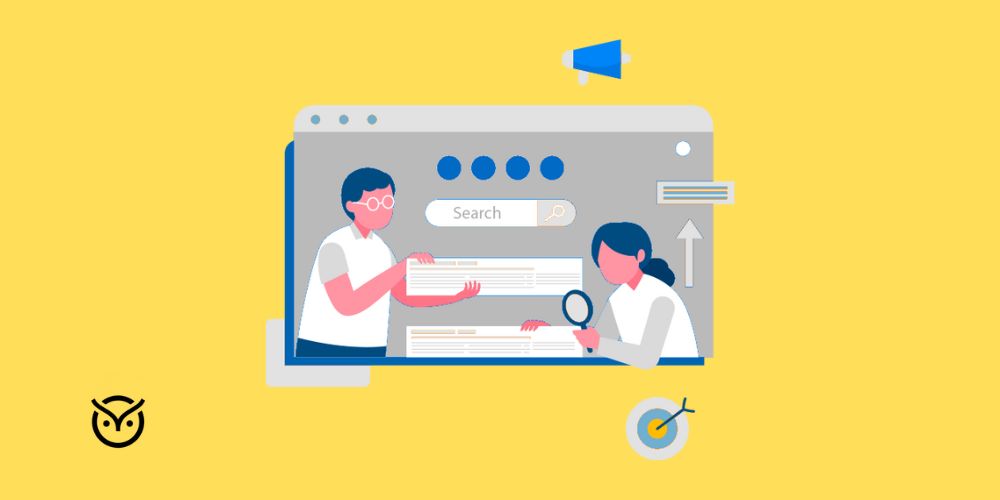
TL;DR
- Most countries set the minimum working age between 14 and 16.
- In the US, federal law allows limited work at 14, with stricter rules until 16.
- Canada, UK, Australia: 13–16 with part-time exceptions
- Rules vary widely, so always check local labor laws before applying.
- Jobs for teenagers range from retail and food service to online freelancing.
How old do you have to be to get a job? The answer isn’t as simple as picking a number. Different countries have different rules, and even within a country, states and cities may set stricter guidelines. This often leaves teenagers asking, “Can you be 14 and get a job?” or “What age can you get a job where I live?”
The good news is, there are plenty of opportunities once you hit your mid-teens. In places like New York City, there are jobs for 17 year olds in NYC ranging from grocery stores to local restaurants. Once you turn 18, the doors open wider with job opportunities for 18 year olds. Many businesses list jobs hiring immediately, making it simple to begin. This blog covers working age laws, key exceptions, and job options for teens and young adults.
Why Minimum Working Age Laws Exist
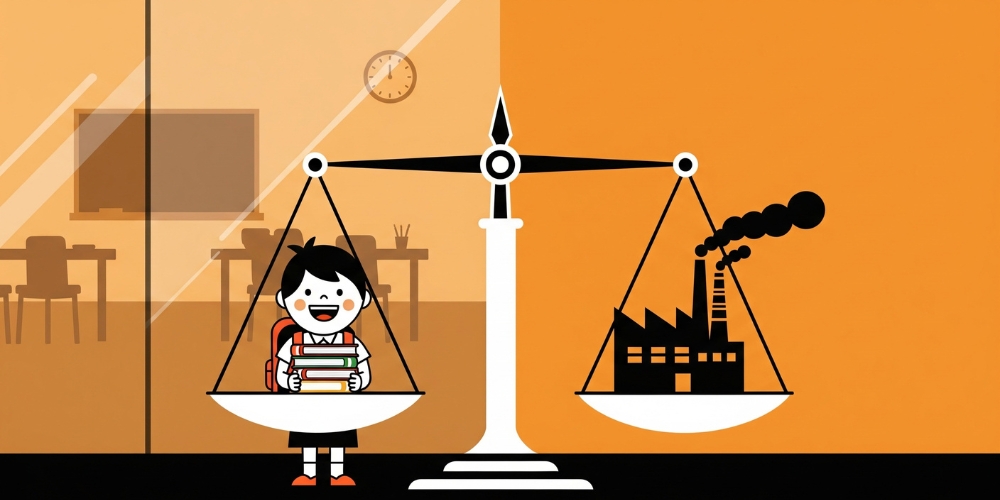
Minimum age laws exist to protect young workers from being exploited. It also exists to make sure education comes first. The International Labour Organization (ILO) reports 138 million children in child labor in 2024, nearly half in hazardous work, prompting strict age laws.
When you reach adulthood, however, the story changes. Employers expect you to handle full-time roles, which is why you see ads for good jobs for 18 year olds, job openings for 18 year olds, or even high paying jobs for 18 year olds. Some of the best jobs for 18 year olds include entry-level positions in healthcare, retail management, and tech support, as well as emerging online work.
Interestingly, this is also when people start comparing educational paths like GED vs high school diploma, because certain job opportunities may require one or the other. Beyond that, stepping into work also brings new rights and responsibilities. At 18, you’re legally recognized as an adult in most countries, which means you can sign contracts, apply for loans, and explore things you can do at 18 besides working.
Minimum Age to Work in Different Countries
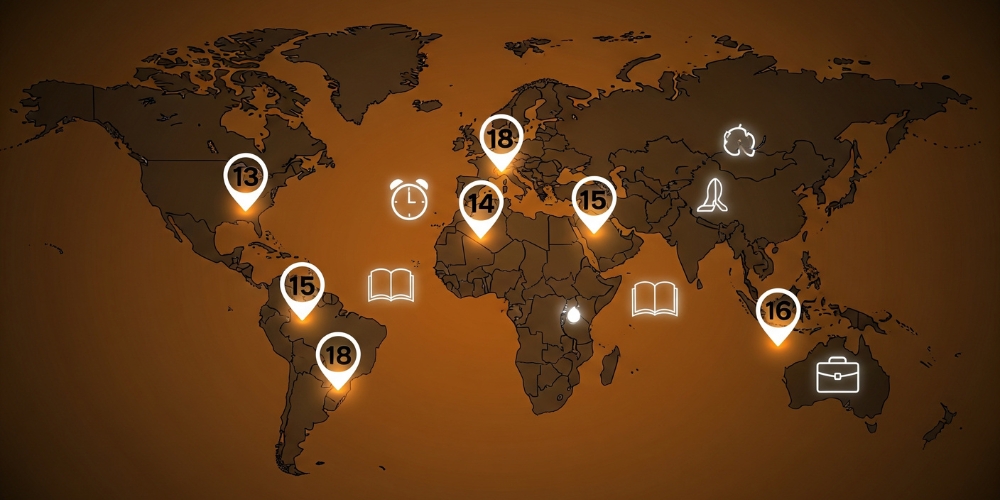
So, how old do you have to be to get a job? The answer varies widely. While international standards, such as those set by the International Labour Organization (ILO), recommend a minimum working age of 15, many countries allow exceptions at 13 or 14 for light work. Others set stricter rules until 16.
Here’s a quick comparison of minimum working ages in some major countries:
How old do you have to be to get a job in different countries
| Country | Minimum Working Age | Notes / Exceptions |
|---|---|---|
| United States | 14 | Restrictions on hours until 16; full-time at 18 |
| United Kingdom | 13 light work | Full-time only after compulsory school (16) |
| Canada | 14–16 (province) | Alberta allows 14; Quebec requires 15 |
| Australia | 13 | Some states allow delivery/retail earlier |
| Germany | 15 | Youth Employment Protection Act; training from 16 |
| France | 16 | 14 for apprenticeships during school holidays |
| Japan | 15 | After compulsory schooling; night limits |
| China | 16 | Strict enforcement; family/training exceptions |
| India | 14 | No hazardous industries until 18 |
| Brazil | 14 apprenticeship | 16 for jobs; 18+ hazardous |
| UAE | 15 | 15–18 need permits; no night/hazardous work |
| South Africa | 15 | Hazardous work only from 18 |
| Mexico | 15 | No hazardous work under 18 |
| Italy | 16 | After compulsory schooling |
| Spain | 16 | Parental consent; apprenticeships from 15 |
| Russia | 16 | 14–15 with parental/school approval |
| South Korea | 15 | Parental consent under 18 |
| Singapore | 13 light work | Full-time 15; hazardous 18 |
| New Zealand | 0 no set minimum | Restrictions under 15; hazardous 18+ |
| Pakistan | 14 | No hazardous until 18 |
| Bangladesh | 14 | Hazardous industries 18+ |
| Philippines | 15 | 15–17 need parental consent; no hazardous |
| Saudi Arabia | 15 | No hazardous/night jobs under 18 |
| Turkey | 15 | Light work from 14 with limits |
| Argentina | 16 | Parental consent until 18 |
| Nigeria | 15 | Apprenticeships from 13 |
| Egypt | 15 | Hazardous jobs from 18 |
| Indonesia | 15 | 13–14 light work; hazardous 18+ |
| Malaysia | 14 | Light work; full-time at 16 |
| Thailand | 15 | Parental consent required |
| Vietnam | 15 | Hazardous only at 18+ |
| Sri Lanka | 14 | Family-based exceptions |
| Nepal | 14 | No hazardous until 18 |
| Afghanistan | 14 | Informal work common |
| Iran | 15 | Hazardous restricted under 18 |
| Iraq | 15 | Permits may be required |
| Qatar | 16 | Permits for 16–18 |
| Kuwait | 15 | No night/hazardous until 18 |
| Bahrain | 15 | Light work from 14 |
| Oman | 15 | Hazardous restricted until 18 |
| Jordan | 16 | Minors need approval |
| Lebanon | 14 | Apprenticeships from 13 |
| Syria | 15 | Hazardous only from 18 |
| Israel | 15 | Light work at 14 with consent |
| Palestine | 15 | Hazardous only at 18 |
| Kenya | 13 light work | Education-first restrictions |
| Uganda | 14 | Hazardous only at 18 |
| Tanzania | 14 | Light work under 16 |
| Ghana | 15 | Informal work common |
| Ethiopia | 14 | Restricted jobs until 18 |
| Sudan | 14 | No hazardous until 18 |
| Somalia | 15 | Informal sector prevalent |
| Morocco | 15 | Parental consent until 18 |
| Algeria | 16 | Hazardous from 18 |
| Tunisia | 16 | Limited hours under 18 |
| Libya | 15 | Hazardous banned |
| Yemen | 14 | No hazardous until 18 |
| Myanmar | 14 | Hazardous only at 18 |
| Cambodia | 15 | Night work restricted |
| Laos | 14 | Full-time at 15 |
| Mongolia | 16 | Exceptions for apprenticeships |
| Kazakhstan | 15 | Hazardous restricted |
| Uzbekistan | 16 | Light work at 14–15 |
| Turkmenistan | 16 | Hazardous from 18 |
| Kyrgyzstan | 16 | Schooling required |
| Tajikistan | 16 | Apprenticeships at 15 |
| Azerbaijan | 15 | Hazardous only from 18 |
| Georgia | 16 | Restricted until 18 |
| Armenia | 16 | Hazardous jobs restricted |
| Ukraine | 16 | 14–15 with consent |
| Belarus | 16 | Hazardous jobs at 18 |
| Poland | 16 | Light work at 15 |
| Czech Republic | 15 | Restricted hours |
| Slovakia | 15 | Training exemptions |
| Hungary | 16 | Apprenticeships possible at 15 |
| Austria | 15 | Hazardous only from 18 |
| Switzerland | 15 | Part-time earlier with consent |
| Netherlands | 15 | Hazardous restricted |
| Belgium | 15 | Training allowed earlier |
| Luxembourg | 16 | Apprenticeships earlier |
| Portugal | 16 | Schooling completed |
| Sweden | 16 | Light work 13+ |
| Norway | 15 | Hazardous restricted |
| Denmark | 13 | Restrictions on hours |
| Finland | 15 | Light work from 13 |
| Iceland | 15 | Limited hours under 18 |
| Ireland | 14 | Light work; 16 full-time |
| Malta | 16 | Training allowed |
| Cyprus | 15 | Hazardous restricted |
| Greece | 15 | Full-time from 16 |
| Croatia | 15 | School consent required |
| Serbia | 15 | Hazardous from 18 |
| Bosnia and Herzegovina | 15 | Restrictions apply |
| Montenegro | 15 | Light work earlier |
| North Macedonia | 15 | Full-time at 16 |
| Bulgaria | 16 | Hazardous restricted |
| Romania | 16 | Apprenticeships possible |
| Lithuania | 16 | Part-time earlier |
| Latvia | 15 | Hazardous only from 18 |
| Estonia | 15 | Light work earlier with consent |
Special Exceptions to Minimum Working Age
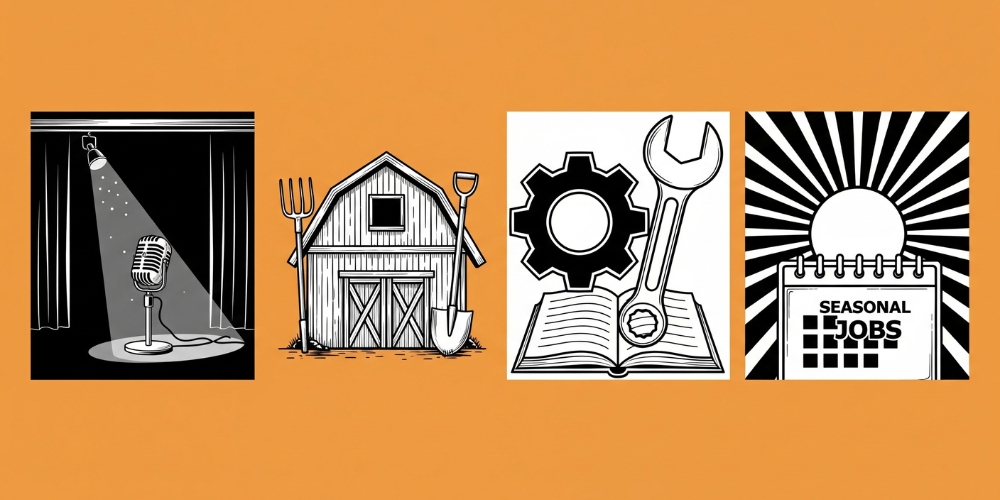
Minimum working age rules aren’t one-size-fits-all. Many countries make special exceptions based on job type, family businesses, or seasonal work.
1. Entertainment Industry
Kids as young as 5 or 6 can work in acting, modeling or music, provided strict permits and limits are followed. For example, in California, child actors need a work permit and can only work a limited number of hours per day.
2. Family Businesses & Farms
In many rural regions, teenagers help out on family farms or shops at much younger ages. In the US, children of any age can work on a farm owned by their parents. And in India, children can help with non-hazardous family enterprises before 14.
3. Apprenticeships
Countries like Germany and France allow apprenticeships starting at 14 or 15. These programs are structured, educational, and limited in hours. They’re designed to give teenagers job-ready skills before adulthood.
4. Holiday & Seasonal Jobs
Some countries loosen restrictions during school holidays. Take France as an example, where kids as young as 14 can take on summer work for up to 35 hours a week.
5. Online & Freelance Jobs
A growing gray area is online work. Many teens wonder, “Do online jobs follow the same minimum working age laws?” Technically, yes, minimum age rules apply to all employment. Platforms like Fiverr and Upwork require users to be at least 18, while others like YouTube allow monetization from 13 with parental supervision. This means that while job opportunities for 18 year olds online are vast, under-18 workers are restricted or need parental accounts.
These exceptions explain why you’ll find ads like jobs for 18 year olds near me hiring immediately while also seeing younger teens working part-time in cafes, farms, or film sets. By the time you’re 18, you’re legally clear for most industries, including high paying jobs for 18 year olds in areas like tech support, trades, and even digital marketing.
Another factor that matters here is preparation. Landing even the best jobs for 18 year olds often requires knowing how to prepare for an interview, polishing your resume, and being aware of AI hiring trends that are reshaping entry-level recruitment worldwide.
Special Exceptions — Scenario Puzzle
How Working Age Rules Differ by Job Type
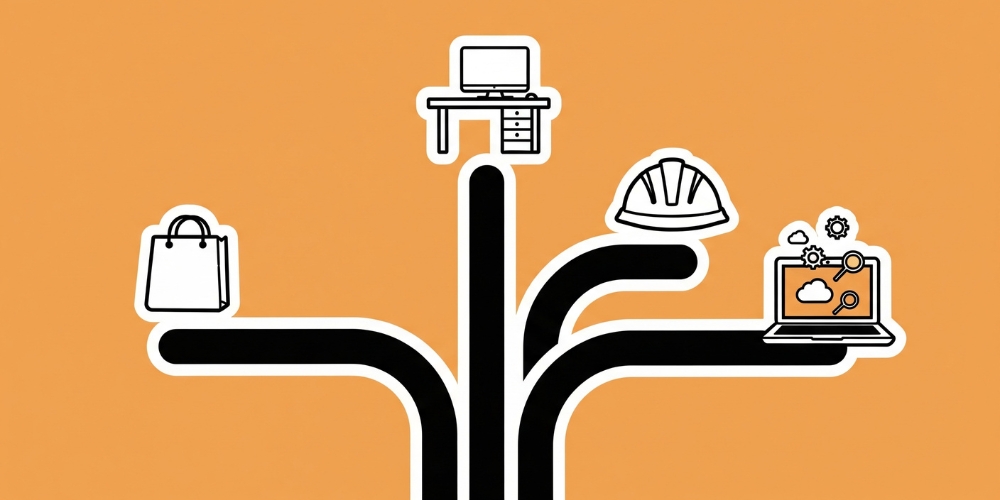
So far, we’ve looked at country-by-country laws. But how old do you have to be to get a job also depends heavily on the type of work. Some jobs welcome younger workers with permits, while others legally require you to be 18 or older.
1. Retail and Food Service
These are the most common jobs for 18 year olds and even younger teens. In the US, 14- and 15-year-olds can take entry-level positions like grocery clerks, dishwashers, or cashiers, but their hours are limited during the school year. By the time you’re 16 or 17, restrictions ease, allowing more freedom in fast food, retail, and hospitality. Cities like New York often post jobs for 17 year olds in NYC in restaurants, clothing stores, and delivery services.
2. Office and Administrative Work
Clerical work usually requires you to be at least 16, though some internships may start earlier with school permission. Once you’re 18, you can apply for job openings for 18 year olds in entry-level office support, customer service, or IT help desks. Many of these are advertised as jobs for 18 year olds near me hiring immediately, especially for companies needing seasonal staff.
3. Hazardous or Regulated Jobs
Labor laws worldwide prevent minors from doing dangerous work. In the US, construction, mining, and factory jobs are off-limits until you’re 18. The same goes for many other countries like South Africa and the UAE, for example, which only allow hazardous work from 18 upward. This is why high paying jobs for 18 year olds often appear in trades or technical apprenticeships, because they’re legally open to adults only.
4. Apprenticeships and Vocational Training
In countries like Germany and France, apprenticeships start as young as 14 or 15. These are structured programs tied to education. By 18, young adults can choose from a wide range of good jobs for 18 year olds in skilled trades, mechanics, or healthcare support, often earning while they learn.
5. Freelance and Online Work
This area is more complicated. While teenagers wonder “when can you start working online?”, most global platforms like Upwork, Fiverr, and PayPal require users to be 18. However, platforms like YouTube allow monetization from age 13 (with parental approval). This means job opportunities for 18 year olds online are much broader and include digital design, content creation, and social media marketing. But younger teens face barriers because payment systems are tied to legal age.
6. Government and Public Sector Jobs
Formal government employment almost always requires you to be 18 or older. In some countries, you must even be 21 to apply. This separates casual or part-time youth jobs from long-term career paths.
The key takeaway? The type of job matters as much as the country. What is the youngest age to get a job depends not just on where you live but also on what you want to do. Some teens start with small roles, but by 18 you’re eligible for the majority of full-time and stable positions.
Conclusion
So, how old do you have to be to get a job? In most countries, you’ll find opportunities from 14 to 16, with bigger doors opening at 18. While younger teens can explore seasonal, family, or entertainment work, adulthood gives access to the best jobs for 18 year olds, whether in retail, skilled trades, or even digital careers. The path you choose may also depend on education, like comparing GED vs highschool diploma, and preparation, like learning how to prepare for an interview. At every stage, knowing your rights and opportunities is the first step toward building a strong future.




